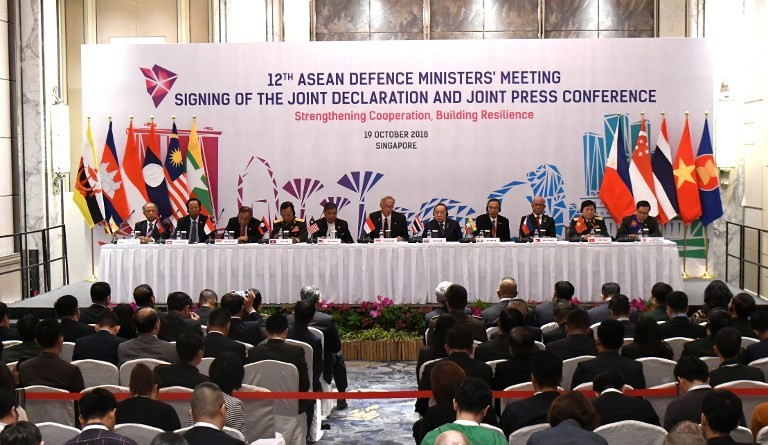Popular Reads
Top Results
Can't find what you're looking for?
View all search resultsPopular Reads
Top Results
Can't find what you're looking for?
View all search resultsASEAN defense chiefs ink world's first multilateral air code
Change text size
Gift Premium Articles
to Anyone
 ASEAN defence ministers hold signing ceremony of 12TH ADMM Joint Declaration at the Association of Southeast Asian Nations (ASEAN) security summit in Singapore on October 19, 2018. From left, Brunei's Second Defence Minister Halbi Mohd Yusof, Cambodia's Deputy Prime Minister and Defence Minister Tea Banh, Indonesia's Defence Minister Ryamizard Ryacudu, Laos' Defence Minister, Lieutenant General Chansomone Chanyalath, Malaysia's Defence Minister Mohamad Sabu, Singapore's Defence Minister Ng Eng Hen, Thailand's Deputy Prime Minister and Defence Minister, General Prawit Wongsuwan, Myanmar's Defence Minister, Lieutenant General Sein Win, Philippines' Defence Secretary Delfin Lorenzana, Vietnam's Defence Minister, General Ngo Xuan Lich and ASEAN Deputy Secretary General Hoang Anh Tuan.
ROSLAN RAHMAN / AFP (AFP/Roslan Rahman)
ASEAN defence ministers hold signing ceremony of 12TH ADMM Joint Declaration at the Association of Southeast Asian Nations (ASEAN) security summit in Singapore on October 19, 2018. From left, Brunei's Second Defence Minister Halbi Mohd Yusof, Cambodia's Deputy Prime Minister and Defence Minister Tea Banh, Indonesia's Defence Minister Ryamizard Ryacudu, Laos' Defence Minister, Lieutenant General Chansomone Chanyalath, Malaysia's Defence Minister Mohamad Sabu, Singapore's Defence Minister Ng Eng Hen, Thailand's Deputy Prime Minister and Defence Minister, General Prawit Wongsuwan, Myanmar's Defence Minister, Lieutenant General Sein Win, Philippines' Defence Secretary Delfin Lorenzana, Vietnam's Defence Minister, General Ngo Xuan Lich and ASEAN Deputy Secretary General Hoang Anh Tuan.
ROSLAN RAHMAN / AFP (AFP/Roslan Rahman)
A
SEAN defense chiefs have inked the world's first multilateral air guidelines aimed at keeping the increasingly congested skies safe for military aircraft and preventing skirmishes over the high seas.
The non-binding code complements an existing set of protocols for navy vessels: the Code of Unplanned Encounters at Sea (Cues), which is designed to reduce the chances of accidents at sea, especially in contested waters such as the South China Sea.
Defense ministers of the 10 ASEAN member states signed a joint declaration on Friday, Oct. 19, at the annual ASEAN Defense Ministers' Meeting (ADMM), pledging to promote regional peace and stability, as well as deepening cooperation in counter-terrorism, air and sea safety, and cyber security, among other things.They will, for instance, set up a virtual network of experts to counter chemical, biological and radiological threats from terrorist groups and rogue states.
Also in the pipeline are joint maritime exercises between ASEAN and China, as well as ASEAN and the United States.
Speaking after the signing, Defense Minister Ng Eng Hen said ASEAN navies are on their way to Zhanjiang in China for the first ASEAN-China maritime exercise to be held next week.
ASEAN ministers also agreed on an ASEAN-US maritime exercise next year, although officials will have to discuss where to hold it.
The ministers also adopted the "Our Eyes" Initiative, an Indonesian-led counter-terrorism intelligence-sharing platform that, until now, involved only five other Southeast Asian countries, including Singapore.
The 10 ministers are hoping to convince the partner-countries of ADMM-Plus - Australia, China, India, Japan, New Zealand, South Korea, Russia, and the US - to sign on to the air code, as they did with Cues at last year's meeting.
Regional countries have been modernizing their militaries, including air forces, to keep pace with new security challenges. Data shows that defense expenditure in the Asia-Pacific is projected to rise by 23 per cent to more than US$530 billion (S$730 billion) in 2020.
The new air guidelines - a set of communication protocols called Game (Guidelines for Air Military Encounters) - are meant to reduce the likelihood of accidents that could escalate into a conflict, especially with increased air traffic in the region.
While they are non-binding and voluntary, they serve as a "practical confidence-building measure" for air forces to improve their operational safety.
Asked at a press conference about the usefulness of such non-binding protocols in the light of a recent near-miss between a US warship and a Chinese destroyer in the South China Sea, Ng likened the guidelines to seat belts in vehicles.
"Is the glass half empty or half full? Without them, does one expect the encounters would get worse? I think the answer is, yes, it may very well be that if there were no guidelines, there would be increased risk of mishaps," he said.
"In a way they are like seat belts - not completely protective but at least you'll find some protection."
The new air code is applied to unplanned encounters between military aircraft over high seas, and spell out acceptable and unacceptable behavior, such as keeping a safe distance, avoiding reckless maneuvers and "[refraining] from the use of uncivil language or unfriendly physical gestures".
The guidelines adhere to existing aviation standards, national and international law, as well as ASEAN principles of transparency and mutual trust.
Singapore has been instrumental in pushing for the implementation of these guidelines, as this year's ASEAN chair.
Ng had outlined three priorities during Singapore's tenure: counter-terrorism; confidence-building measures and code for unplanned encounters at sea and in the air; and dealing with chemical, biological and radiological threats.
It hands the ADMM chairmanship to Thailand on Saturday at the conclusion of the ADMM-Plus, where the eight dialogue partners are expected to come on board to boost counter-terrorism cooperation.






